Bonmahon Beach Stephens Day
December 29, 2008
21:37 PM
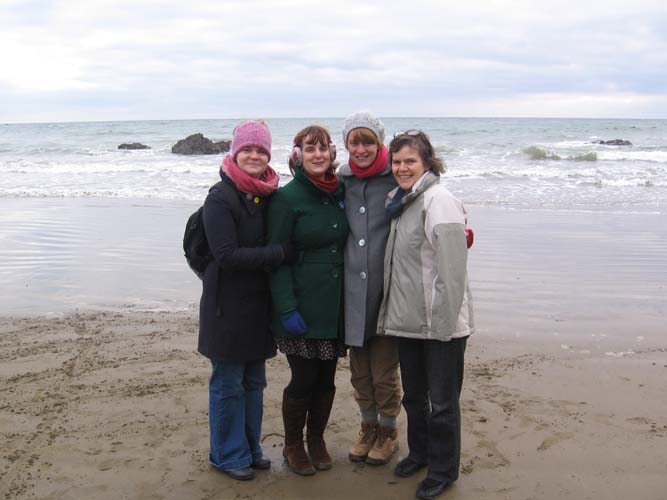
My camera, a Cannon Power Shot, died on Christmas eve and I feel a bit bereft ever since.
I have been borrowing Deirdre’s similar one from time to time and have ordered another Power Shot from Pixmania (at less than half the price I paid four years ago) This one I took with Deirdre’s camera and is of the daughters and Sile, not often we all get together anymore.
The observant among you may notice the new arrival, due in just three weeks, hidden under Caitriona’s coat.
Hopefully the new camera will have arrived by then.
Rhyming Chowder
December 27, 2008
10:37 AM
Ever since reading (and trying out) Sydney Smith’s rhyming recipe for Salad Dressing I have had a weakness for these recipes, even to the extent of trying out one myself for the poached egg*.
I am enjoying Mark Kurlansky’s ; The Last Fish Tale, given to me by daughter Eileen for the Christmas. In it he gives a recipe for Chowder (here spelled Chouder) taken from the Boston Evening Post in 1751 which is in rhyme.
First lay some Onions to keep the Pork from burning,
Because in Chouder there can be no turning;
Then lay some Pork in Slices very thin,
Thus you in Chouder always must begin.
next lay some Fish in crossways very nice
Then season well with Pepper, Salt and Spice;
Parsley, Sweet Marjoram, Savory and Thyme
then Biscuit next which must be soaked some time.
Thus your foundation laid, you must be able
To raise a Chouder, high as Tower of Babel:
For by repeating o’er the Same again,
You may make Chouder for a thousand Men.
Last Bottle of Claret, with Water eno’ to smother ’em
You’ll have a mess which some call Omnium gather ’em.
I haven’t tried it yet, but can but admire the use of both capital letters and herbs.
*For your forgiveness everyone I beg
For giving out this recipe one more time
Again I tell you how to poach an egg
But this time do the blasted thing in rhyme.
First get some water, fresh from tap or well
And pour into a poaching pan or pot
Put this upon the heat and wait a spell
Till seething water tells you that it’s hot.
Into this water add a spoon or two
Of the best vinegar made from wine or malt
But one thing you must never ever do
Upon your life don’t dream of adding salt
Now from a hen who lives on primrose path
Break in a cup an egg so fresh its hot
Insinuate this in the bubble bath
(Which is the water boiling in the pot)
But only now the therms should be reduced
The water should just shudder on low heat
From that time when the egg was introduced
Until opaque and lifted out to eat
How long that this should be is up to you
It hangs on how you like your egg to be
Soft yolkéd after one minute or two
Or hard boiled should you give it four or three
Now lift it forth by use of slotted spoon
And let it stand over the pot to drain
Don’t dream to put it on the toast too soon
Or this will taste like cardboard after rain
Now put it on the slice of wholemeal toast
Which you have buttered should you like the taste
(It all depends on what you like the most
The taste of butter or a slender waist)
And then, at last the the breaking of your fast
When finally your hunger pangs you quell
But for a taste forever unsurpassed
Anoint with pepper and some Fleur de Sel
2 comments
Wren Boys
December 26, 2008
17:04 PM
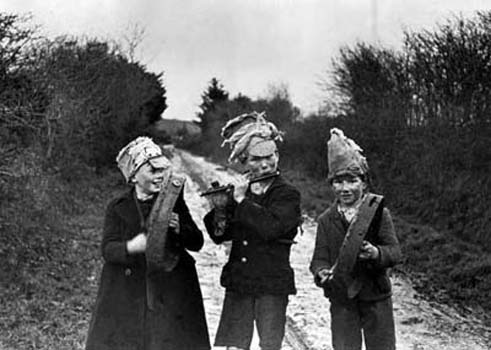
Photographer: Caoimhín Ó Danachair, 1947
We weren’t deeply into any Irish traditions in middle class Cork in the fifties when I was a boy.
There was however one day of the year when we followed an unique Irish tradition and that was on Stephens Day when every year we went around all local houses as Wren Boys.
I am fairly sure that the main motive for this observance was deep personal greed.
Usually a few days before Christmas we would have gone on a similar visitation of local houses but on that occasion we would have gone Carol singing, always for a designated charity.
Wren boying had no such altruistic motives, every penny we made on Stephens day was immediately spent in Mr. O Sullivans shop on the Lower Road on sweets.
Wren boying as a tradition has a long history in Ireland, it has all sorts of significance and originally involved the transportation of a dead Wren on a branch.
Our interpretation was not quite so authentic.
We would dress in a motly assortment old raggy dressing up clothes, muddy up our faces and then go sing the Wren Song outside houses.
The Wren the Wren
The king of all birds
St Stephens Day
Was caught in the furze
Up with the kettle and down with the pot
Give us our answer and let us begone
Knock at the knocker
Ring at the bell
Give us a copper for singing so well
Singing so well
Singing so well
Give us a copper for singing so well
At that moment we would be usually greeted by the man or woman of the house who would open the door.
This was our cue to sing the next bit.
God bless the Mistress of the house
A Glolden Chain around her neck
And be she sick or be she sore
The lord have mercy all the more
Then we would launch once more into:
Knock at the knocker……….
This was the moment when we would be handed some loose change, always fairly cheerfully.
After thirty or so houses we would usually have about thirty shillings which bought one hell of a lot of sweets in Mr. O’s
I have never seen a wren boy in Waterford and so must assume the custom has died out here.
Christmas Dinner
December 26, 2008
11:05 AM
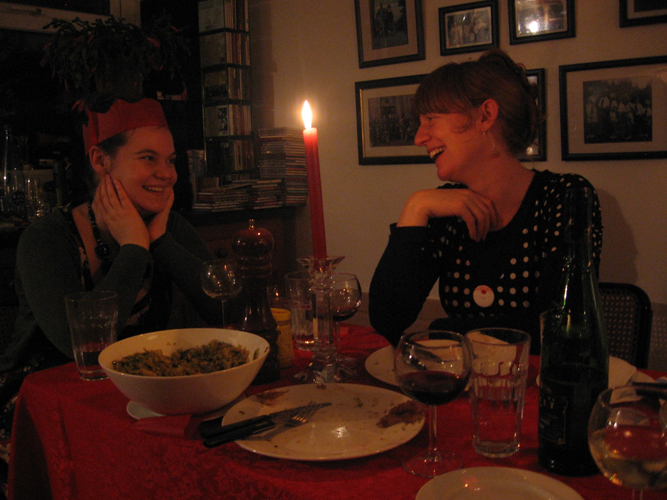
Deirdre and Caitriona at Christmas dinner, photographed by Eileen
2 comments
Happy Christmas
December 23, 2008
08:57 AM
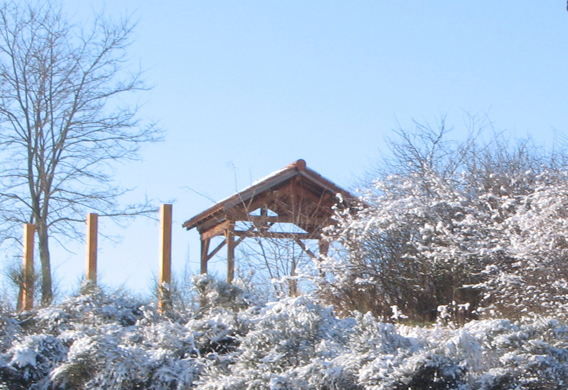
“A cold coming we had of it,
Just the worst time of the year
For the journey, and such a long journey:
The ways deep and the weather sharp,
The very dead of winter.’
And the camels galled, sore-footed, refractory,
Lying down in the melting snow.
There were times we regretted
The summer palaces on slopes, the terraces,
And the silken girls bringing sherbet.
Then the camel men cursing and grumbling
And running away, and wanting their liquor and women,
And the night-fires going out, and the lack of shelters,
And the cities hostile and the towns unfriendly
And the villages dirty and charging high prices:
A hard time we had of it.
At the end we preferred to travel all night,
Sleeping in snatches,
With the voices singing in our ears, saying
That this was all folly.
Then at dawn we came down to a temperate valley,
Wet, below the snow line, smelling of vegetation;
With a running stream and a water-mill beating the darkness,
And three trees on the low sky,
And an old white horse galloped away in the meadow.
Then we came to a tavern with vine-leaves over the lintel,
Six hands at an open door dicing for pieces of silver,
And feet kicking the empty wine-skins,
But there was no information, and so we continued
And arrived at evening, not a moment too soon
Finding the place; it was (you may say) satisfactory
All this was a long time ago, I remember,
And I would do it again, but set down
This set down
This: were we led all that way for
Birth or Death? There was a Birth, certainly,
We had evidence and no doubt. I had seen birth and death,
But had thought they were different; this Birth was
Hard and bitter agony for us, like Death, our death,
We returned to our places, these Kingdoms,
But no longer at ease here, in the old dispensation,
With an alien people clutching their gods.
I should be glad of another death.”
— T. S. Eliot
The picture is of some snow in the Cevennes last week, this time in a garage forecourt
(But note the symbolic -if accidental- “three trees on a low sky” )
And the words the correct version of “The Journey of the Magi” the T S Eliot poem I misquoted in my last piece.
(I had confused it with a song by Dr. Strangely Strange,
I blame the confusion on Picpoul de Pinet)
Happy Christmas to All !
3 comments
I sing of a maiden
December 23, 2008
04:53 AM
In 1969 when I was in UCC I was asked to select and recite some Christmas prose and poetry for a Christmas concert being held in the Aula Maxima.
I chose something out of Dickens; of course, and a TS Eliot poem about the Coming of the Magi, I remember a line:
A hard coming we had
And a harder going.
And then I was delighted to find ( I think in Palgraves Golden Treasury) the words of a particularly simple and charming Medieval English Carol which I quote below.
I remember quoting it off to my friend Jim Flanagan who also liked it.
As he was also to perform at the concert, in his case singing Christmas songs, he decided to set the carol to a simple folk tune and sing it at the concert also.
Last week listening to a Carol Concert sung by the National Chamber Choir I heard Benjamin Brittan’s version of the same song.
Personally I preferred Jim’s.
Here are the words:
I sing of a maiden
that makeles is
King of all kings
to her son she ches.
He came all so still
where his mother was,
As dew in April
that falleth on the grass.
He came all so still
to his mother’s bow’r,
As dew in April
that falleth on the flow’r.
He came all so still
where his mother lay,
As dew in April
that falleth on the spray.
Mother and maiden
was never none but she.
Well may such a lady
Goddès mother be.
A letter to the paper
December 22, 2008
11:09 AM
I have on various occasions been tempted to write a letter to the paper, the most recent, about the drinking habits of the French, to the Irish Times last year was not deemed worthy of publication.
However I have now been granted the next best thing, a letter about my piece about my ancestor William Martin Murphy was published in last Thursday’s Irish Times.
For those of you who may have missed it I quote it below in full and convey thanks to Mr. Kett for at last getting my name on to the letters page.
Thursday, December 18, 2008
A whited sepulchre
Madam,
In his portrayal of his great-great-granduncle,
William Martin Murphy (Magazine December 6th),
Martin Dwyer writes: “Being a devout Catholic,
he was instrumental in blackening Parnell’s name
when the affair with Kitty O’Shea was exposed. .
. There is no doubt that he exploited and underpaid
many of his workers.”
Could one paint a more revealing picture of a
whited sepulchre?
– Yours, etc,
DESMOND KETT,
Kilbarrack Gardens,
Dublin 5.
2 comments
Laying the Floor
December 20, 2008
06:52 AM
Last Thursday myself and my friend Clive Nunn boarded the Oscar Wilde in Rosslare and headed south to France to lay a new floor in the dining room of Le Presbytère.
Sometimes one is fortunate in ones friends and Clive, who is a master of all things made of wood, particularly old wood, and a keen Francophile as well, was just the perfect person to lay the floor for me.
We had also decided that this would be a good moment to transport our black Kilkenny Marble table ( in fact a sort of limestone and originally designed and made by the same Clive) down to France.
I knew I was coming along as gopher and my chief responsibility would be to make sure that there were regular meals on the table at all times and a regular supply of the oak we had selected for the floor.
We had selected the oak with great care in Castorama the previous summer.
It was a lovely old honey colour with wide knotty boards and we reckoned it would be perfectly in character with the fabric of the old building it was going into.
We had been carrying on an email correspondence with one Nicolas in Castorama, had paid our deposit on the wood, called Athena, and he had emailed us just a few days before we left to assure us that our order had arrived.
After a long journey and the usual unintended detours ( I now have an intimate knowledge of the Rocade of Caen and of the Cevennes which were unexpectedly covered in snow) we arrived at Castorama in Beziers on Friday afternoon a few hours before closing.
Then followed about two incredibly frustrating hours of being sent backwards and forewords from Guillaume to Jacques (I asked one girl at one stage was this the first time they had ever sold wood) until we were at last united with our order.
There was no mistaking it, the name Dwyer printed on the label , the brand Athena written on each plank, but it was clearly the wrong colour.
Instead of the honey tones on the sample board in the shop this was silvery grey.Clive looked at it critically.
He knew that if we refused this order our entire journey would be wasted as we only had managed to fit in this window before Christmas with the greatest difficulty.
He also knew that in his other role as designer of the renovations in the house he would have to live with this wood if we accepted it.
“Its been limed” he said, “but I like it, it won’t be as rustic but it will be more elegant”
We were in business.
We loaded the van with the small mountain of wood and headed back to the Presbytère with firm intentions of depleting the Languedoc wine lake.
The following day, when we actually started studying the planks, we discovered that French solid oak flooring comes in much thinner planks than its Irish counterpart so to achieve an even floor we were going to have to line the entire area with a coating of plywood.
Off we headed to Gedimat, the builders suppliers in nearby Murveil.
After some time with a charming man there ( have you ever tried to mime the word plywood?) we discovered that the French word for plywood was contre plaqué, that he didn’t stock it, but that we might get some in M. Bricolage in Magalas.
We fairly charged to Magalas (it was now around 11 and the French get peckish at 12 for their long lunch)
In M. Bricolage the –again helpful and charming- salesman in the wood department told us that he wouldn’t have anything like that amount of contre plaqué in stock so our only chance was to head off into the centre of Beziers (a city fully the size of Limerick) and there find Panadoc who should be able to give us what we wanted.
But it was now 11.40 and Panadoc would close for the weekend at 12.00.
We charged for Beziers , very aware that without contre plaqué our job couldn’t start and we would lose Saturday and Sunday out of our precious pre-Christmas window.
By some miracle of navigation and luck we arrived at the gates of Panadoc at about two minutes to twelve and I charged in to try and persuade the now possibly ravenous and starving sales man to serve us.
I don’t think you would have to stretch your imagination too far to image the reaction I would have got in the same situation in an Irish Builders Suppliers.
The young man in charge here gave the immediate impression that we had made his day.
He couldn’t have been more helpful.
He himself came into the yard and loaded the ply into the van and then got the cashier to write my cheque for me, full of amiable curiosity of what we were going to use the wood for.
We hade been saved by the bell.
Heading back to Thezan we both realised that all of our encounters with various builders suppliers that morning had been helpful and friendly, even though in two of the occasions we plainly weren’t going to buy anything.
So much for the cold arrogant French.
The rest of the sojourn was positively mundane after that first twenty four hours.
Clive worked all the hours of the day to get the floor successfully down, he even saved sufficient time for us to do a huge shop around for wine, visiting Pinet for my Picpoul and St. Chinian for some excellent reds, before we set off for Ireland on Wednesday.
Here is the finished floor, a lovely even if incorrect colour, and the table sitting proudly in the middle.
We are getting there.
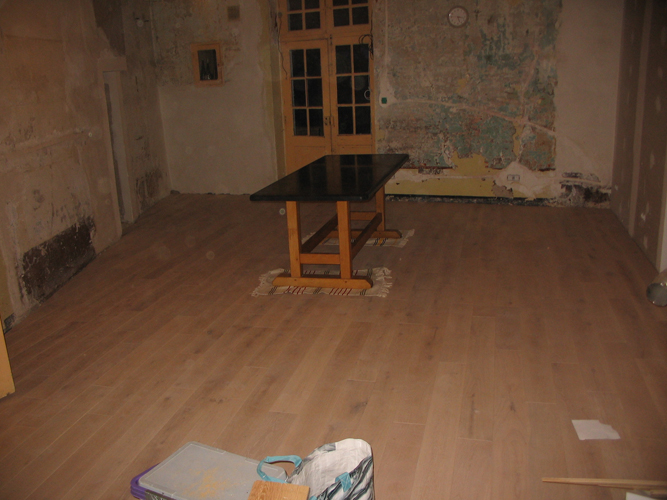
2 comments
Snow in the Cevennes
December 14, 2008
11:32 AM
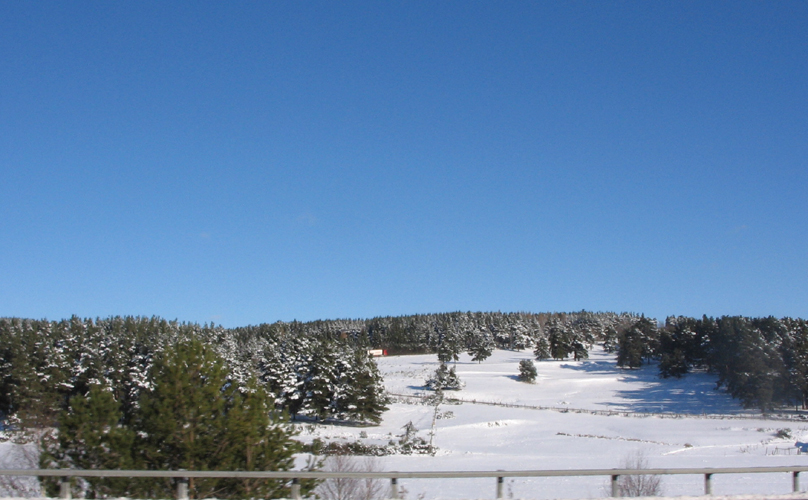
On the way down to the Languedoc on Friday we passed over the Cevennes
which were obligingly covered with seasonal snow.
1 comment.
Lost in Translation Twenty Nine
December 9, 2008
09:53 AM

And thank you to friend Finola for sending me this.
|
